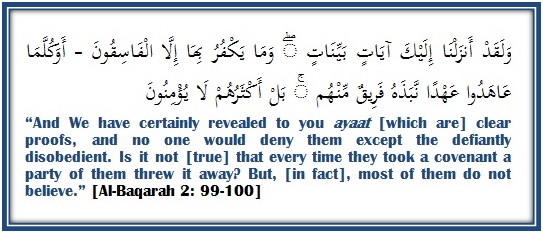Tafseer Surah Baqarah Verse 99-101 | Surah Baqarah explanation in English | Surah Baqarah explained | Surah Baqarah Ayat 99 to 101
Tafseer Surah Baqarah Verse 99-101 | Surah Baqarah explanation in English | Surah Baqarah explained | Surah Baqarah Ayat 99 to 101 Translation
بِسْمِ اللَّهِ الرَّحْمَـنِ الرَّحِيمِ
In the Name of Allah, the Most Gracious, the Most Merciful
Proofs of Muhammad’s ﷺ Prophethood
 |
| Surah Baqarah Verse 99-100 |
Ibn ‘Abbas radhiAllahu ‘anhu commented that this ayah means: You recite and convey this Book to them day and night, although you are an Ummi (unlettered) who never read a book. Yet, you inform them of what they have (in their own Books). This fact should serve as an example, a clear sign and a proof against them, if they but knew. Those who disbelieve in the signs are the Fasiqoon (defiantly disobedient). Because they don’t want to act on the commands therefore, the best solution that they could come up with was to deny the ayaat altogether.
After sending the Messenger of Allah ﷺ, when Allah subhanahu wa ta’ala reminded the Jews of their covenant with Him, especially concerning Muhammad ﷺ, Malik bin As-Sayf said, “By Allah! Allah never made a covenant with us about Muhammad, nor did He take a pledge from us at all.” It was then that Allah subhanahu wa ta’ala revealed this ayah, “Is it not [true] that every time they took a covenant a party of them threw it away?” Hasan Al-Basri commented: There is not a promise that they make, but they break it and abandon it. They make a promise today and break it tomorrow.
LESSON:
We, as Muslims, have made several pledges with Allah subhanahu wa ta’ala. When He created us He asked us if He was not our Lord, all of us confirmed that indeed, He is our Lord. Being His creation we must submit to Him. We cannot give preference to our desires over what He commands us to do.
We seek refuge with Allah subhanahu wa ta’ala from disobedience and transgression, and we ask Him to He make us His humble servants, ameen.
 |
| Surah Baqarah Verse 101 |
As-Suddi commented: When Muhammad ﷺ came, the Jews living in Madinah wanted to contradict and dispute with him using the Torah. However, the Torah and the Qur’an affirmed each other. So the Jews gave up on using the Torah, and took to the Book of Asaf, and the magic of Harut and Marut, which indeed did not conform to the Qur’an. Hence Allah’s statement,
كَأَنَّهُمْ لاَ يَعْلَمُونَ
“…as if they did not know [what it contained].” Qatadah said that it means they knew the truth, but abandoned it, hid it and denied the fact that they even had it.
LESSON:
Why did the Jews threw their Book behind their backs and followed that which they desired? It is because they gave more preference to their likes and dislikes, and not what Allah subhanahu wa ta’ala desired.
Where is the Qur’an in our homes? Is it on the top most shelf? And is it only taken down when someone dies in the family or a calamity strikes? What are *we* doing with the Book of Allah?
When something is important to someone, they keep it close at hand. For example, you have to check your daily messages and perhaps, news headlines. You keep your phones and other devices nearby for an easy access. Many of us wake up, and the first thing that we check is our phone. How many of us, remember Allah subhanahu wa ta’ala as soon as our eyes open up? How many of us thank Him in the initial seconds of knowing we have survived another day?
Questions to Ask Yourself:
• Where is the Qur’an kept in my home?
• If it is on a shelf, then how high is it?
• How often do I open it up?
• If not daily, then why not?
• Why can’t I find time for the Qur’an? What is keeping me occupied?
If we can exert our resources for the success of this world, then we can certainly exhaust ourselves in striving for the Hereafter. Many people complain that they cannot understand the Qur’an because it is in a foreign language. Many of the people who have this complaint are not native English speakers, yet they know English. How did you learn English? By regularly going to school and attending the classes. If you can learn a new language to survive the challenges of this world, can you not learn the language of the Qur’an for the success in the Hereafter?
Yes, it requires commitment. But the results will be lasting.















No comments:
Post a Comment